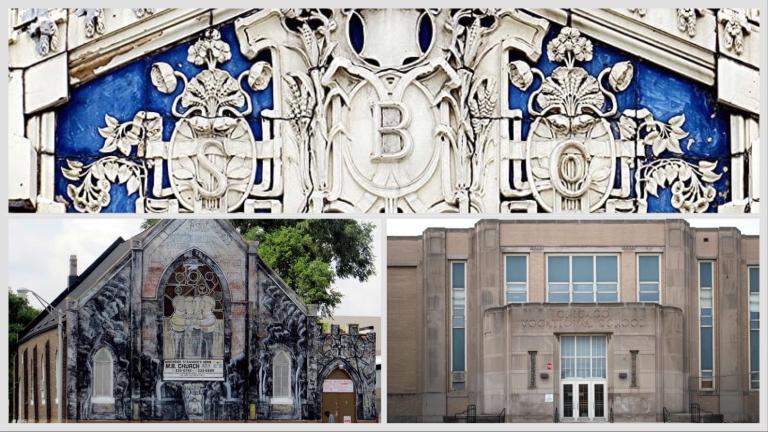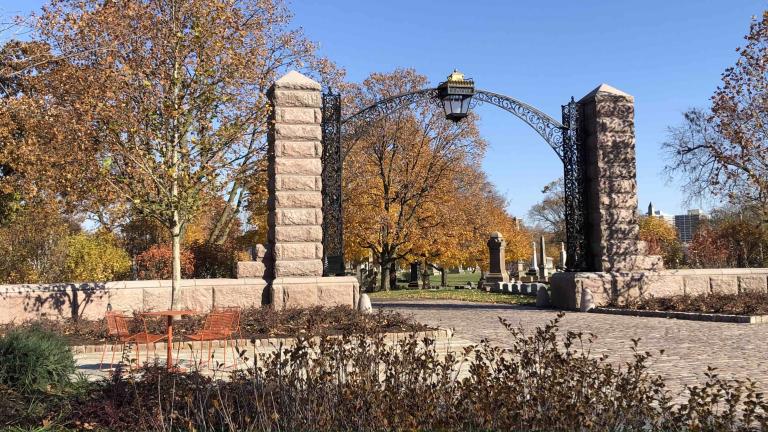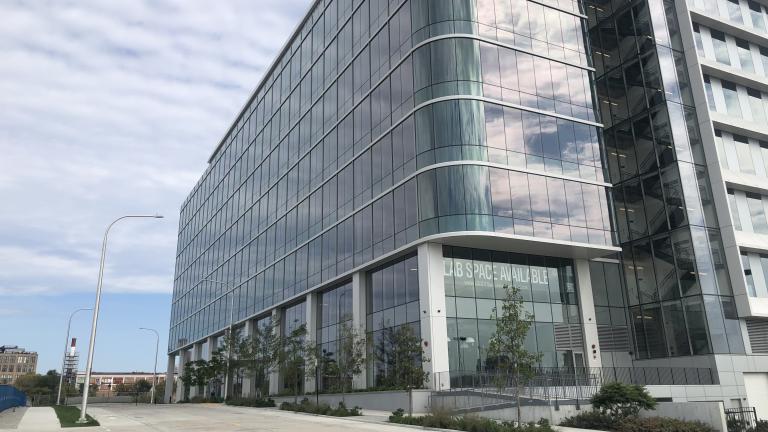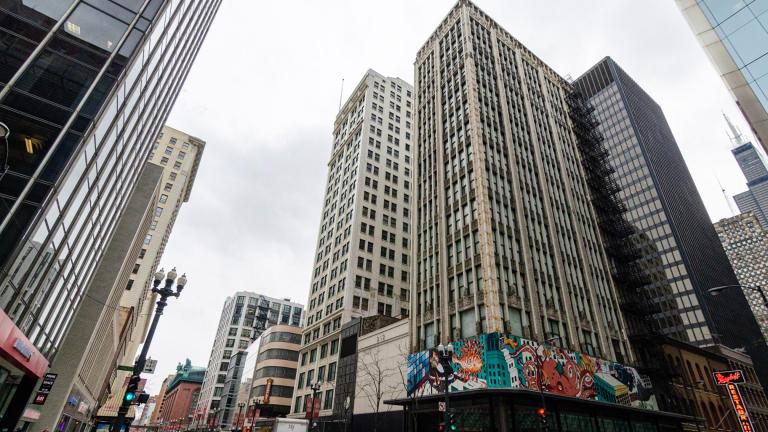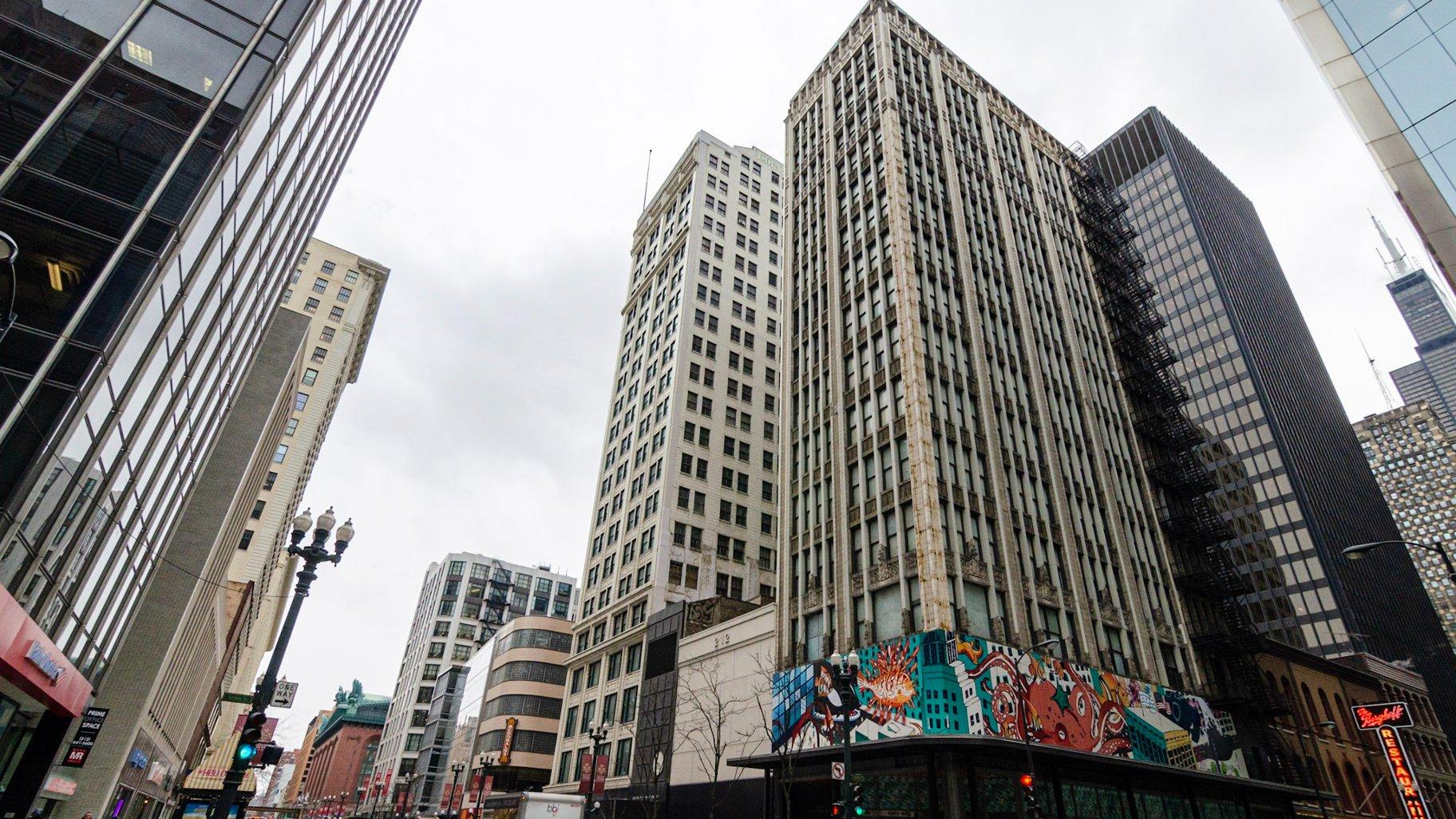 The Century Building, 202 S. State St., built in 1916, architects Holabird and Roche. Consumers Building, 220 S. State St., built in 1913, architects Jenney, Mundie and Jensen. (Preservation Chicago / Eric Allix Rogers)
The Century Building, 202 S. State St., built in 1916, architects Holabird and Roche. Consumers Building, 220 S. State St., built in 1913, architects Jenney, Mundie and Jensen. (Preservation Chicago / Eric Allix Rogers)
A pair of endangered early 20th century State Street skyscrapers has been thrown a potential lifeline by the Commission on Chicago Landmarks, which voted unanimously Thursday to grant the Century and Consumers buildings preliminary landmark status.
The 1913 Consumers Building at 220 S. State St., and its neighbor, the 1916 Century Building, have sat vacant since their acquisition in 2005 by the federal government via eminent domain. In 2022, $52 million was appropriated to demolish the buildings, which officials have long argued pose a security threat to the nearby Dirksen Federal Building.
When the Century and Consumers came before the landmark commission in September 2022, Chairman Ernie Wong declined to take a vote, citing unusual circumstances and the need for commissioners to better understand the security issues.
“I am now satisfied it’s time to move forward,” Wong said Thursday.
In the intervening months, the General Services Administration (GSA) — which manages the government-owned buildings — has initiated a Section 106 review in which federal agencies must consider the effects of their actions on historic properties. Kandalyn Hahn of Chicago’s Department of Planning and Development has participated in that process and shared a status update with commissioners.
The GSA is weighing three options for the buildings, she said: one is demolition, another is to take no action, and a third is to allow adaptive reuse if 15 security criteria are met.
It was that last option that provided commissioners with a path forward, as they approved language in the landmark designation that allows wiggle room should the GSA settle on adaptive reuse. For example, GSA’s proposed criteria include installation of exterior lighting “necessary to achieve courthouse security objectives” and the removal of fire escapes that would allow access from the street.
Typically, landmark approval would prohibit such significant alterations, but the motion adopted by commissioners Thursday states, “The Commission shall have flexibility to allow modifications to the Century (and Consumers) Building to accommodate the GSA’s reuse criteria in order that viable reuse of the building can be achieved.”
A reuse proposal on the table would have the buildings renovated to contain a Chicago Collaborative Archive Center.
Malachy McCarthy, archivist at the Claretian Missionaries in Chicago, is among those promoting the center and called the opportunity a “wonderful marriage” of historic preservation and historical records. Speaking to commissioners, he pointed out an archive’s unique suitability to meet security needs: Archives don’t need light, he said, meaning windows could be walled off, and access to the buildings would be by appointment only.
The Commission votes unanimously in favor of landmarking the Century building, sending a signal to the Feds that #reuse is preferrable to demolition and compromise is possible. May its terra cotta gleam again! Up next: the Consumers building. pic.twitter.com/8t9io3jWio
— CAC Watch List (@CACWatchList) April 13, 2023
Concerns the buildings may soon face the wrecking ball became heightened in recent weeks when the GSA began preparing to demolish a non-historic building that sits between the Century and Consumers, telling WTTW News that the unoccupied building was structurally unsound and presented the risk of potential facade collapse.
In her report to commissioners, Hahn noted that Century and Consumers appear to be structurally sound, and that GSA has stated it will take precautions to ensure the demolition of the smaller building doesn’t affect the historic pair.
With the preliminary landmark designation, preservationists can allow themselves a tentative sigh of relief, though Kendra Parzen of Landmarks Illinois conceded, “Landmark status adds a layer of protection but may not be enough,” as the ball remains very much in the federal government’s court.
The Consumers Building, at 220 S. State St. in the Loop, also received a preliminary landmark recommendation today. The 1913 building reflects fundamental components of Chicago School architecture, defined by taller buildings that maximized natural light & usable interior space. pic.twitter.com/YHGYtR1jx3
— Chicago DPD (@ChicagoDPD) April 13, 2023
Preservation Chicago has included Century and Consumers on its annual list of the city’s “most endangered” buildings and championed their survival, gathering more than 23,000 signatures on a petition supporting landmarking. In a city known for its skyscrapers, Century and Consumers represent the culmination of Chicago’s first golden age of architecture before WWI, said Ward Miller, the organization’s executive director.
It was an era when the city took its ambitions vertical — picture the Century Building as something like a towering indoor mall versus street-level retail — and white glazed terra cotta was all the rage.
“Cities were very dirty and sooty, and terra cotta was bright,” art historian Rolf Achilles told the commission. “White terra cotta glowed, to make Chicago visible at night.”
Though the style may have been superseded, it was still held in high regard by later architects.
The chorus of people speaking out on the buildings’ behalf at Thursday’s meeting included Dirk Lohan, the grandson of famed architect Ludwig Mies van der Rohe, who designed the Dirksen Federal Building.
Lohan said his grandfather had intentionally respected the Century and Consumers when conceiving the federal building. “The suggestion to tear them down is a disgrace and an insult to Chicago’s proud history,” Lohan said.
In a statement submitted to the commission, the GSA said it was neutral on the landmark designation. The agency expects to continue its Section 106 review throughout 2023, with city officials including Hahn taking part in monthly discussions.
Contact Patty Wetli: @pattywetli | (773) 509-5623 | [email protected]

